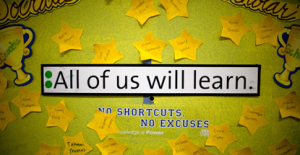My friend Alan Bevan and I have been discussing how to improve schooling outcomes for kids (as one does) and Alan raised the conclusions of the 2007 McKinsey Report. I asked Alan to write a bit about the report and the professional issues it raises as a springboard for discussion. What follows is Alan’s contribution to get us thinking and talking.
The 2007 Mc Kinsey report, How the World’s Best Performing School Systems Come Out on Top identified common attributes of high-performing school systems and reached some sharply focused conclusions.
It suggests that three things matter most:
- Getting the right people to become teachers,
- Developing them into effective instructors, and,
- Ensuring the system is able to deliver the best possible instruction for every child.
Elsewhere it says:
- The quality of an education system cannot exceed the quality of its teachers
- The only way to improve outcomes is to improve instruction
- High performance requires every child to succeed
With so much focus on getting high quality teachers, it was interesting to read how best performing school systems achieve that. Class size and salaries were not major factors (although some systems front weighted their salary bands to ensure above average pay for graduates). What mattered most was making teaching a high status profession. This was achieved in a number of ways including limiting positions for teacher training, marketing and recruitment strategies, creating elite bands within the profession, and setting rigorous academic standards – for example, in Finland all teachers must have a Masters degree.

Once these quality teachers were recruited and employed, top performing systems maintained a continuous focus on instruction through professional development programs.
The 2007 report was supplemented in 2010 with further research entitled
How the World’s Most Improved School Systems Keep Getting Better which analysed twenty systems from around the world, and concluded that
a system can make significant gains from wherever it starts – and these gains can be achieved in six years or less.
Again, the research found that improving systems generally spend more of their activity on improving how instruction is delivered. It suggests that six interventions are common for these systems, namely: building the instructional skills of teachers and management skills of principals, assessing students, improving data systems, facilitating improvement through the introduction of policy documents and education laws, revising standards and curriculum, and ensuring an appropriate reward and remuneration structure for teachers and principals.
I found myself in hearty agreement with the notion of a fierce focus on instruction and teacher quality and was particularly interested in the strategy of making teaching attractive to high performers by making the profession difficult to enter. But I wondered if there was a dimension missing from this report.
I’m convinced the report is on the money with regard to the system input perspective but there is another perspective – that of the student. I found myself pondering the Australian experience over the past 20 or 30 years with Vietnamese refugees – boat people who arrived in most cases with little or no English and many with horrific tales to tell of war and unimaginable hardship. These people settled into Australian society, in most cases grateful for the opportunities the new land gave them. They saw education as critical for the future of their children in this new land. There is at least anecdotal evidence to suggest that the children of these refugees have outperformed the average achievements of children in Australian schools and that they are consistently over-represented in university graduation ceremonies across the country.

KIPP Schools message
What is the significance of that – the same education system – different outcomes? For me, it says that the attitudes from home are possibly as important a determinant of academic success as are the skills and attitudes of the teachers. And if that is true, can anything be done to improve this aspect of the schooling equation.
We know that marketing can change attitudes.

KIPP Schools message http://www.kippbayarea.org/schools/bridge/photo-gallery
Would successful school systems have marketing messages for parents and children as well as messages for potential teacher recruits?

 Once these quality teachers were recruited and employed, top performing systems maintained a continuous focus on instruction through professional development programs.
Once these quality teachers were recruited and employed, top performing systems maintained a continuous focus on instruction through professional development programs.
